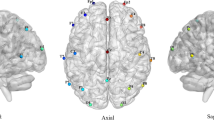Abstract
In order to make a deep analysis of depression, the construction and recognition of functional brain network model based on depression is mainly studied. Firstly, the relevant information of the subjects is introduced in turn. The data of fMRI (functional magnetic resonance imaging) are pretreated, static and dynamic functional connections are analyzed, statistical analysis and testing are carried out, and then the results are analyzed and discussed. The results show that static functional connectivity provides a new research perspective and means for further understanding the connection patterns of brain functional networks in unipolar depression and bipolar depression. Dynamic functional connectivity analysis (DFA) extends the previous studies on unipolar depression and bipolar depression, and provides a potential biological marker for clinical identification of unipolar depression and bipolar depression.






Similar content being viewed by others
References
Woo, C. W., Chang, L. J., Lindquist, M. A., and Wager, T. D., Building better biomarkers: Brain models in translational neuroimaging. Nat. Neurosci. 20(3):365, 2017.
Bassett, D. S., and Sporns, O., Network neuroscience. Nat. Neurosci. 20(3):353, 2017.
Redlich, R., Almeida, J. R., Grotegerd, D., Opel, N., Kugel, H., Heindel, W., and Dannlowski, U., Brain morphometric biomarkers distinguishing unipolar and bipolar depression: A voxel-based morphometry–pattern classification approach. JAMA Psychiatry 71(11):1222–1230, 2014.
Su, J. P., Liu, H. F., Zhang, H. L., He, Y. J., and Nie, Y., Effects of different degrees of depression on inflammatory response and immune function in patients with ovarian cancer. J. Biol. Regul. Homeost. Agents 32(5):1225–1230, 2018.
Di Stasio, D., Candotto, V., Serpico, R., Migliozzi, R., Petruzzi, M., Tammaro, M., Maio, C., Gritti, P., Lauritano, D., and Lucchese, A., Depression and distress in burning mouth syndrome: A case control study. J. Biol. Regul. Homeost. Agents 32(2 Suppl. 1):91–95, 2018.
Torous, J., Staples, P., and Onnela, J. P., Realizing the potential of mobile mental health: New methods for new data in psychiatry. Curr. Psychiatry Rep. 17(8):61, 2015.
Dai, Z., Yan, C., Li, K., Wang, Z., Wang, J., Cao, M., and He, Y., Identifying and mapping connectivity patterns of brain network hubs in Alzheimer's disease. Cereb. Cortex 25(10):3723–3742, 2014.
Liu, F., Guo, W., Fouche, J. P., Wang, Y., Wang, W., Ding, J., and Chen, H., Multivariate classification of social anxiety disorder using whole brain functional connectivity. Brain Struct. Funct. 220(1):101–115, 2015.
Calhoun, V. D., and Sui, J., Multimodal fusion of brain imaging data: A key to finding the missing link (s) in complex mental illness. Biol. Psychiatry Cogn. Neurosci. Neuroimaging 1(3):230–244, 2016.
Author information
Authors and Affiliations
Corresponding author
Ethics declarations
Conflict of Interest
Author Lin Wen declares that he has no conflict of interest. Author Shan Liu declares that he has no conflict of interest. Author Yurong Cao declares that he has no conflict of interest. Author Guiling Li declares that he has no conflict of interest.
Ethical Approval
All procedures performed in studies involving human participants were in accordance with the ethical standards of the institutional and/or national research committee and with the 1964 Helsinki declaration and its later amendments or comparable ethical standards.
Informed Consent
Informed consent was obtained from all individual participants included in the study.
Additional information
Publisher’s Note
Springer Nature remains neutral with regard to jurisdictional claims in published maps and institutional affiliations.
This article is part of the Topical Collection on Systems-Level Quality Improvement
Rights and permissions
About this article
Cite this article
Wen, L., Liu, S., Cao, Y. et al. Construction and Recognition of Functional Brain Network Model Based on Depression. J Med Syst 43, 236 (2019). https://doi.org/10.1007/s10916-019-1198-4
Received:
Accepted:
Published:
DOI: https://doi.org/10.1007/s10916-019-1198-4




